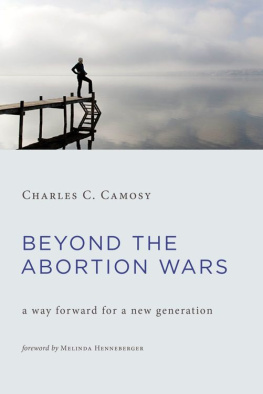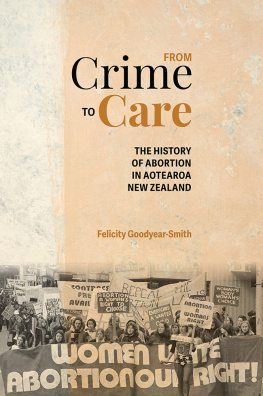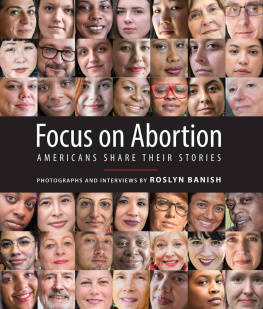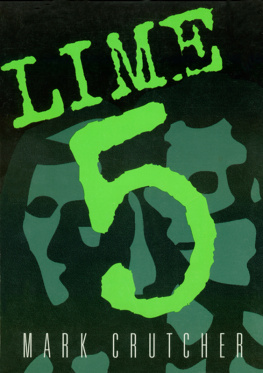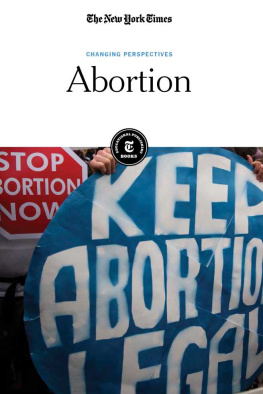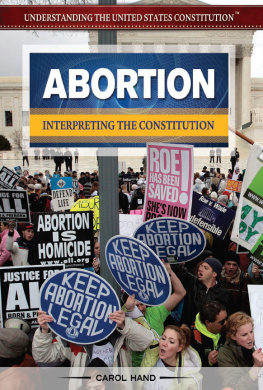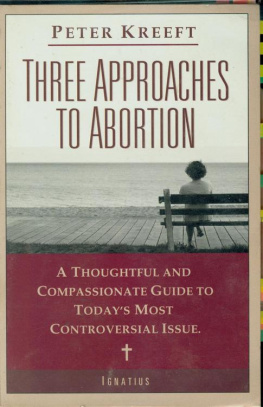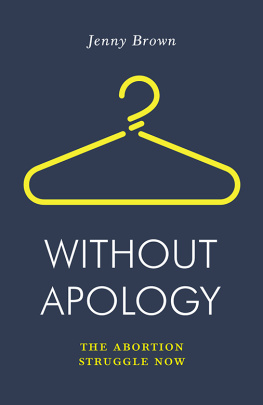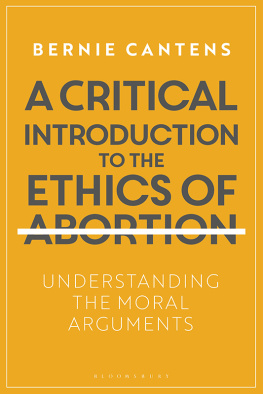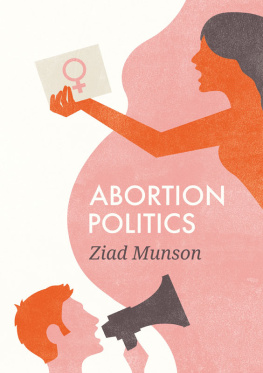Beyond the Abortion Wars
A Way Forward for a New Generation
Charles C. Camosy
William B. Eerdmans Publishing Company
Grand Rapids, Michigan / Cambridge, U.K.
2015 Charles C. Camosy
All rights reserved
Published 2015 by
Wm. B. Eerdmans Publishing Co.
2140 Oak Industrial Drive N.E., Grand Rapids, Michigan 49505 /
P.O. Box 163, Cambridge CB3 9PU U.K.
Printed in the United States of America
Library of Congress Cataloging-in-Publication Data
Camosy, Charles Christopher.
Beyond the abortion wars: a way forward for a new generation /
Charles C. Camosy.
pages cm
Includes bibliographical references and index.
ISBN 978-0-8028-7128-2 (cloth: alk. paper)
eISBN 978-1-4674-4291-6 (ePub)
eISBN 978-1-4674-4251-0 (Kindle)
1. Abortion Political aspects. 2. Womens rights. I. Title.
HQ767.C253 2015
305.42 dc23
2014041218
www.eerdmans.com
This book is dedicated to the thousands of graduate, undergraduate, and high-school students Ive had the privilege to teach.
Much of what follows comes from our
exchanges and arguments.
Contents
Foreword
After decades of acrimony, gridlock, and fundraising on the abortion issue, there is now quite a lot of discussion about forging a working compromise between those who describe themselves as pro-life and those who describe themselves as pro-choice. So far, unfortunately, that conversation is only happening on the pro-life side; at least, Im unaware of any pro-choice leader who has said publicly that abortion should be limited in any way at any point in pregnancy.
The right-to-life lobby, however, along with many pro-life politicians, does see the pain-capable legislation that would limit abortion after twenty weeks with exceptions for rape, incest, and the life of the mother as both acceptable and politically possible, though Republicans would, of course, have to take both the U.S. Senate and White House for that to happen. Pro-choice advocates tend to see this concession as merely strategic: a dangerous step on the slippery, sloped road to a total ban. But the split that the pain-capable push has caused within the pro-life ranks argues otherwise. As does strongly pro-life South Carolina Senator Lindsey Graham, who recently told me in an interview that only a minority of pro-lifers would ban all abortions. Polling certainly bears that out.
In this book, Fordham theologian Charles Camosy leans pretty heavily on polling that indicates that the public wants first-term but not even second-term (let alone third-term) abortion to remain legal. He argues that major restrictions are thus inevitable, especially with those in the Millennial demographic expressing significantly more pro-life views than do their parents. I would counter that, if lawmakers so neatly took their cues from surveys, significant gun-control legislation would have passed easily after twenty first-graders were shot and killed at Newtown, Connecticut.
But the importance of Camosys book is in his meticulous construction of the ethical and moral case for early abortion in instances of rape. And his proposed compromise fully answers the leading rap on the pro-life approach: that the true aim is to control women, and that the proof of this motivation is the scant pro-life support for women when theyre not weighing whether to end a pregnancy or for children once theyre born. Camosys proposed compromise would change that: his plan offers so much real support to women and children that it could significantly reduce the number of abortions performed for economic reasons.
As Camosy knows, I cant say that I agree with every aspect of his proposal. On the contrary, his compromise suggestion that, after eight weeks of gestation, rape victims would have to provide evidence in court that they were assaulted to get access to a legal abortion is a deal-breaker for me, even though he is right that women in that situation typically know very early that theyre pregnant. He argues persuasively that the law is a moral teacher, yet I tend to think that criminalizing the procedure (even if physicians are punished rather than patients) would teach lessons other than that unborn children deserve our protection.
Yet he makes so many important points that I hope this work will be widely read and seriously debated. I particularly urge readers from across the spectrum on this issue to consider Camosys arguments
- concerning all thats wrong with our binary, youre either for it or against it discussion;
- laying out ethical pro-life arguments apart from the religious ones that those who disagree so often assume must motivate any objection;
- challenging and tracking the history of accepted data;
- explaining the implications of the shift from the privacy concerns protected by the Roe decision to the undue burden banned under Casey;
- making the case that those who oppose rape exceptions are party to a broader refusal to take violence against women seriously; and
- spelling out how what he calls pro-life extremists effectively give the unborn rights that nobody out walking around in the world has, specifically, to be protected from harm even while threatening someone elses life.
Finally, what about the hardcore pro-lifers who want to ban all abortions? he asks. First, let me say something directly to the Catholics who fall into this group. You may not think that the Mother and Prenatal Child Protection Act perfectly reflects your view of abortion, but you really should support something like it nevertheless. You should support it because the Church explicitly teaches that faithful Catholics may support incremental legislative change if the political realities give you a proportionately serious reason to do so. And if you dont think our current discourse on abortion in the United States gives you such a reason, frankly, you need a dose of political reality.
Though the tide is turning against abortion on demand, it is absolutely not turning in the direction of banning all abortion. There is overwhelming support for abortion choice in the cases of rape and the life of the mother. Indeed, over 90 percent of pro-choicers support these exceptions, as do almost 70 percent of pro-lifers. The position in favor of banning all abortion is a political nonstarter. Those who have pushed this position aggressively in the public sphere have done tremendous damage to the pro-life cause. Pro-lifers achieve our goals when we help focus the public debate on the overwhelming majority of abortions, most of which the public does not support. But the ban all abortion strategy has allowed pro-choicers to shift our debate away from the reality of our abortion culture by focusing public attention on the two percent of abortions taking place in the cases of rape and when the mothers life is in danger.
Finally, I have to commend the way Camosy consulted his female colleagues in writing this book. One he quotes anonymously but quite powerfully and provocatively buttresses his important argument about what choice women really have in a society that in many regards offers us such limited support:
Women need to ask themselves if access to abortion really has done more to liberate them. If a woman does decide to parent, is she really free to make that decision if she has no partner, limited 12 weeks unpaid maternity leave, hopelessly expensive childcare, and on and on and on? Abortion has made women free not to have children, but it has arguably made it more difficult for women to choose to have children. What else have women gained? A hook-up culture which breeds sexual violence, increasing numbers of STDs, less-committed and even childlike male partners who couldnt identify responsibility if it hit them in the face, and a culture that values [women] only when they are young and skinny. Is that freedom?
If youre starting to suspect that this is a book that will completely satisfy no constituency, youre right. Whatever your view, it will be challenged here. And if youre willing, youre highly likely to learn something as a result.
Next page
